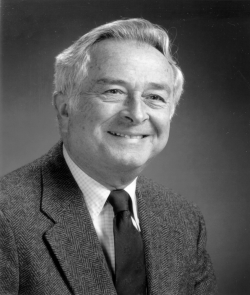Biographical Sketch:
Louis C. Lasagna was born February 22, 1923, in New York City. He received his M.D. from Columbia University in 1947, interned at New York City hospitals, and spent two years as a Research Fellow at the Anesthesia Research Laboratory at Massachusetts General Hospital. From 1954 to 1970, Dr. Lasagna was on the faculty of the Johns Hopkins School of Medicine, where he started the first academic group devoted solely to clinical pharmacology. In 1970, he was appointed the first Chairman of the Department of Pharmacology and Toxicology at the University of Rochester School of Medicine and Dentistry; and in 1984, he was named Dean of the Sackler School of Graduate Biomedical Sciences at Tufts University, the position he held at the time of the interview in 1995. While at the University of Rochester, he founded the Center for the Study of Drug Development, which moved to Tufts in 1984. Dr. Lasagna is internationally recognized as an authority on clinical trial methodology, analgesic and hypnotic drugs, medical ethics, and the placebo effect. He has served as a consultant to the Food and Drug Administration and to several other government agencies. But he was perhaps best known for his modern revision of the Hippocratic Oath. Dr. Lasagna died in 2003.
His papers are archived at the University of Rochester.
Topical Index:
The interview is organized topically with a loose chronology, beginning with a brief outline of Lasagna’s early education and continuing on to discuss his work with Henry K. Beecher at Harvard University in the early 1950s; his leadership of the Division of Clinical Pharmacology at Johns Hopkins University; chairmanship at the University of Rochester; work with the Center for the Study of Drug Development; and deanship of the Sackler School of Graduate Biomedical Sciences at Tufts University. Most of the interview deals with issues relating to drug evaluation and experimentation, including informed consent; blinding; problems of pain assessment; placebo response; pros and cons of the randomized clinical trial; patient selection; use of narcotics and narcotic antagonists in medicine; LSD experimentation; FDA drug evaluation and the Drug Efficacy Study of the 1960s; development of the NSAIDs (nonsteroidal anti-inflammatory drugs); and methods of pain management, including acupuncture.
Interview History:
Dr. Lasagna was interviewed in his office at the Tufts University Sackler School of Graduate Biomedical Sciences in Boston, Massachusetts by Marcia L. Meldrum on September 8, 1995. The interview lasted approximately 2.0 hours. The transcript was audit-edited by Fiona McPherson and was reviewed by Dr. Lasagna prior to its accession by the History of Pain Collection. The tape and transcript are in the public domain, by agreement with the oral author. The original recordings, consisting of two (2) 90-minute audiotapes, are in the Library holdings and are available under the regulations governing the use of permanent noncurrent records. Records relating to the interview are located in the offices of the History & Special Collections Division.
Dates: 8-Sep-95
Interviewer: Marcia Meldrum
Dates: 10-Sep-96
Interviewer: Donald Klein
Transcript:
Louis C. Lasagna
Papers:

